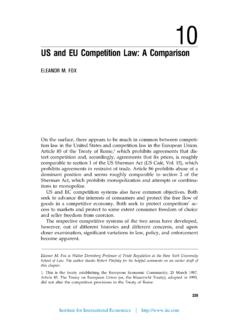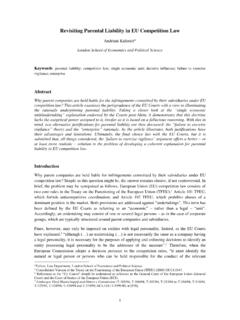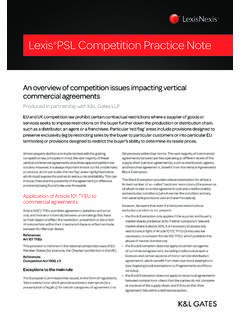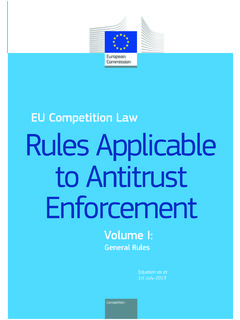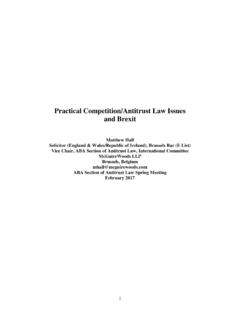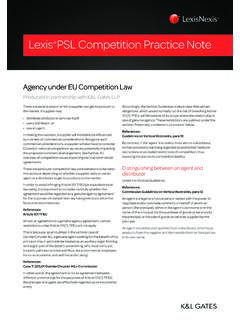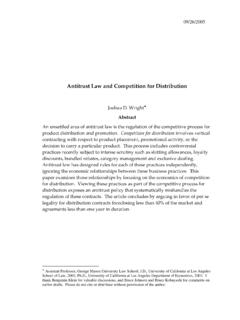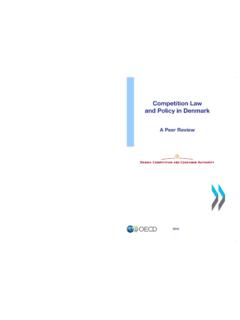Transcription of COMPETITION LAW AND POLICY IN THE UNITED STATES THE UNITED ...
1 COMPETITION LAW AND POLICY IN THE UNITED STATES 1 THE UNITED STATES (From 1 October 2001 to 30 September 2002) Table of Contents Introduction I. Changes in law or policies A. Changes In Antitrust Rules, Policies, or Guidelines B. Proposals to Change Antitrust Laws, Related Legislation or Policies C. International Antitrust Cooperation Developments II. Enforcement of antitrust laws and policies: actions against anticompetitive practices A. Department of Justice and FTC Statistics 1) DOJ Staffing and Enforcement Statistics 2) FTC Staffing and Enforcement Statistics B. Antitrust Cases in the Courts 1) UNITED STATES Supreme Court 2) Court of Appeals Cases a.
2 Significant DOJ Cases Decided in FY2002 3) Private Cases Having International Implications C. Statistics on Private and Government Cases Filed D. Significant DOJ and FTC Enforcement Actions 1) DOJ Criminal Enforcement 2) DOJ Civil Non-Merger Enforcement 3) FTC Non-Merger Enforcement Actions E. Business Reviews Conducted by the Department of Justice III. Enforcement of antitrust laws and policies: mergers and concentrations A. Enforcement of Premerger Notification Rules B. Significant Merger Cases 1) DOJ Merger Challenges or Cases 2) FTC Merger Challenges or Cases a. Preliminary Injunctions Authorized b. Commission Administrative Decisions IV.
3 Regulatory and trade POLICY matters A. Regulatory Policies 1) DOJ Activities: Federal and State Regulatory Matters 2) FTC Staff Activities: Federal and State Regulatory Matters B. DOJ and FTC Trade POLICY Activities V. New Studies related to antitrust POLICY A. Antitrust Division Economic Analysis Group Discussion Papers B. Commission Studies and Reports, and Economic Working Papers 1) Commission Studies and Reports a. Workshops COMPETITION LAW AND POLICY IN THE UNITED STATES 2 b. Studies and Reports 2) Economic Working Papers Appendices Department of Justice: Fiscal Year 2002 FTE and Actual Amount by Enforcement Activity Federal Trade Commission: Fiscal Year 2002 COMPETITION Mission FTE and Dollars by Program by Bureau/Office COMPETITION LAW AND POLICY IN THE UNITED STATES 3 ANNUAL REPORT ON COMPETITION POLICY DEVELOPMENTS IN THE UNITED STATES (October 1, 2001 through September 30, 2002) Introduction 1.
4 This report describes federal antitrust developments in the UNITED STATES for the period October 1, 2001, through September 30, 2002 ( FY 2002 ). It summarizes the activities of both the Antitrust Division ( Division ) of the Department of Justice ( Department or DOJ ) and the Bureaus of COMPETITION and Economics of the Federal Trade Commission ( Commission or FTC ). I. Changes in law or policies A. Changes in Antitrust Rules, Policies or Guidelines 2. On January 4, 2002, AAG James announced a modernization of the Antitrust Division so as to address new industries, network COMPETITION , and other emerging trends in the economy. The restructuring redefines areas of responsibility and streamlines reporting lines in order to improve overall efficiency.
5 The modernization plan concentrates investigatory and enforcement expertise and resources for commodities within particular sections and minimizes the dispersion of efforts across sections. It also assigns to each section enforcement responsibility for both civil merger and non-merger matters. The modernization effort recognizes the emergence and future importance of certain areas of the economy-- including information technology, telecommunications and industries characterized by network COMPETITION --and the need for concentrated, focused expertise in these industries. 3. After extensive internal review and analysis of the Division's best practices for investigating mergers and acquisitions, AAG James announced on October 12, 2001 the details of the Merger Review Process Initiative.
6 The goals of the initiative are to more quickly identify critical legal, factual and economic issues regarding proposed mergers, facilitate more efficient and more focused investigative discovery, and provide for an effective process for the evaluation of evidence; it should also, where possible, reduce the investigative burden upon parties proposing transactions. The initiative, which is completely voluntary for parties proposing mergers, addresses the use of the initial 15- (for cash tenders and bankruptcy transactions) or 30-day waiting period, the issuance of the Second Request, and the post-Second Request Period: Initial 30-day waiting period: The staff is encouraged to be as aggressive as possible during the initial 15- or 30-day waiting period by making voluntary requests for information, and through early consultation with the parties.
7 Issuance of Second Request: The staff will use the knowledge gained within the initial 15- or 30-day period to tailor the Second Requests as narrowly as possible to the transaction and the goals of the investigation. Post-Second Request Period: The initiative encourages staff to engage in regular consultations with the parties, and in appropriate circumstances commit to procedural agreements in exchange for specific undertakings by the parties regarding their submission of information and compliance with particular investigative requests. COMPETITION LAW AND POLICY IN THE UNITED STATES 4 4. The Commission's Bureau of COMPETITION has established three new task forces.
8 The Merger Litigation Task Force is be responsible for reinvigorating the Commission's hospital merger program, which includes a review of, and potential challenge to, consummated transactions that may have resulted in anticompetitive price increases. The Task Force also focuses on merger enforcement in the retail industry, particularly regarding matters involving food, beverages, and supermarkets. Two other task forces are examining two specific antitrust immunities, the State Action Doctrine and the Noerr-Pennington Doctrine. Both of these immunities can serve important Constitutional interests but it is sound antitrust POLICY to seek to limit them to situations that fulfil their underlying purposes.
9 The task forces will consider a variety of actions, including antitrust enforcement, amicus briefs, and COMPETITION advocacy. B. Proposals to Change Antitrust Laws, Related Legislation or Policies 5. Over the course of 2002, the Antitrust Division and the Federal Trade Commission held joint hearings entitled COMPETITION and Intellectual Property Law and POLICY in the Knowledge-Based Economy. At these hearings, the agencies examined the appropriate balance between antitrust and intellectual property law and POLICY . The hearings panels included business people, academics and practitioners representing a wide range of views on topics central to the debate about intellectual property and antitrust POLICY .
10 Some of the panels discussed the ways in which intellectual property rights and COMPETITION each create incentives to innovate. Other panels focused on the effects of the patent regime on COMPETITION . Another primary focus was on COMPETITION concerns related to the licensing of intellectual property. Panels examined a number of issues in detail: 1) patent pools and cross-licensing; 2) standard setting; 3) refusals to license intellectual property; 4) the bundling of intellectual property and the extension of intellectual property rights; 5) agency analysis of uncertain intellectual property rights; 6) settlements; and 7) an international comparative law perspective on refusals to license and bi-lateral/multiparty licensing.










